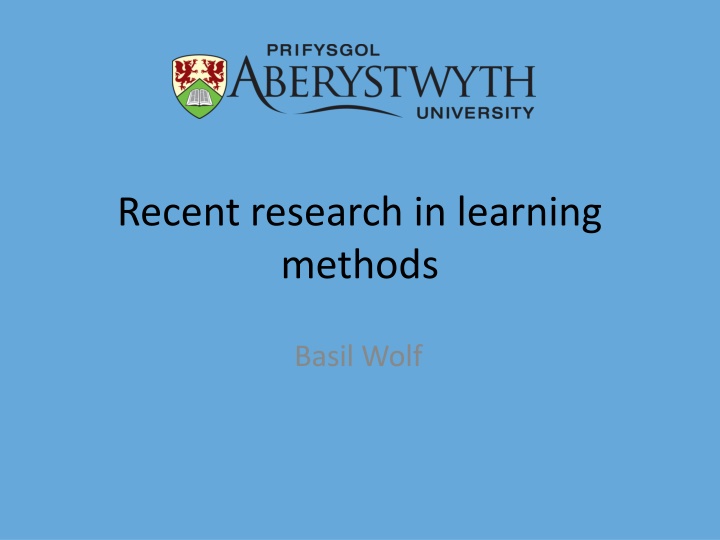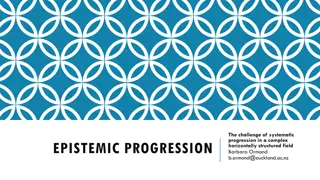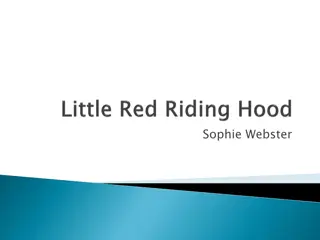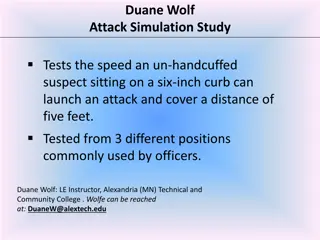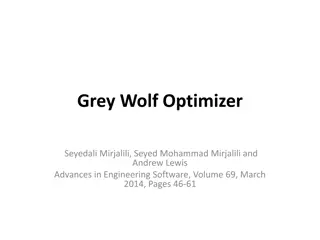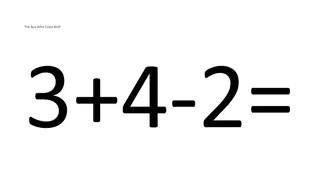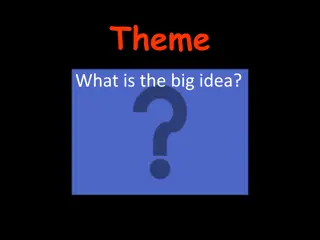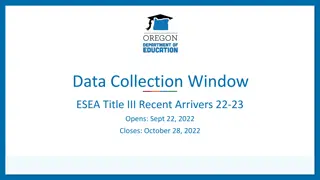Recent Research in Learning Methods by Basil Wolf
Understanding the impacts of cognitive and affective issues on student performance and the importance of evidence-based interventions in education. Explore methods like SOAR Study Method and a Model of Memory to enhance learning outcomes through effective note-taking strategies.
Download Presentation

Please find below an Image/Link to download the presentation.
The content on the website is provided AS IS for your information and personal use only. It may not be sold, licensed, or shared on other websites without obtaining consent from the author.If you encounter any issues during the download, it is possible that the publisher has removed the file from their server.
You are allowed to download the files provided on this website for personal or commercial use, subject to the condition that they are used lawfully. All files are the property of their respective owners.
The content on the website is provided AS IS for your information and personal use only. It may not be sold, licensed, or shared on other websites without obtaining consent from the author.
E N D
Presentation Transcript
Recent research in learning methods Basil Wolf
Car sticker ABER ALUMNI STILL KICKING THE BAR!
My view TUN tries to change us. We need to do more to help the students to change (UKES). Help should be based on research evidence.
Without data youre just another person with an opinion. W. Edwards Deming
Summary Student performance is affected by: Cognitive Affective (non-cognitive) issues. Need evidence based interventions: First year transition Develop effective learning skills Design and supply learning aids
SOAR Study Method Selection Organisation Graphic organisers Association Build associations Regulation Self test Complete note taking Jairam & Kiewra (2009) J Advanced Academics 20: 602-629
A model of memory Retrieval Stimuli Storage & organisation Working (short term) memory Long- term memory Attention - Selection Sensory memory Encoding - Association Jairam & Kiewra (2009) J Advanced Academics 20: 602-629
(Lecture) notes It is our responsibility to teach students how to write good lecture notes. I make sure that my students make good lecture notes.
A model of note taking Stimuli Storage & organisation Working (short term) memory Attention - Selection Sensory memory Note pad Encoding - Association
Notes on note-taking: Review of Research and insights for Students and Instructors http://hilt.harvard.edu/files/hilt/files /notetaking_0.pdf
Advice to students Make notes in your own words. Use abbreviations & diagrams. Review them asap after the lecture. Test yourself and review notes frequently Avoid cramming for exams. Write or type? Choose carefully. Always take notes even if you think you know it.
Advice to instructors Explain policies and link to research outcomes Note-taking Learning practices Pre-lecture materials Identify important concepts Not too much students must note take Encourage note-taking in own words. Make connections across lectures.
Handwritten notes Advantages Student listens and selects Translates into own words Student creates own understanding Easier to draw new diagrams and show relationships Disadvantages Slow pace Incomplete recording Legibility?
Computer notes Advantages Faster More complete record Disadvantages Transcription Less selection of information & understanding More difficult to draw diagrams / mind maps Distractions e-mail, social media
Handwritten v computer Handwritten Advantages Student listens and selects Translates into own words Student creates own understanding Easier to draw new diagrams and show relationships Disadvantages Slow pace Incomplete recording Legibility? Computer Advantages Faster More complete record Disadvantages Transcription Less selection of information & understanding More difficult to draw diagrams / mind maps Distractions e-mail, social media
Organised information Handwritten Computer Student listens and selects appropriate information Less selection and engagement with the subject Rewords information Transcribes lecturer s words More immediate understanding Less immediate understanding Slow incomplete notes More complete record Less legible Legible Distractions e-mail, social media
Mental arithmetic What is 17 x 54?
Stereotypic threat Wise Psychological Interventions Walton 2014 Curr. Dir. Psych Sci 23: 73-82
Women who seek equality with men lack ambition. Timothy Leary
Womens Maths Performance 18 Maths score 8 0 S G ND E Manipulation Dar-Nimrod and Heine 2006. Science 314: 435
Womens Maths Performance 18 Maths score 8 0 S G ND E Manipulation Dar-Nimrod and Heine 2006. Science 314: 435
School and maths exam performance High salience 91.090.4 90.5 Correct responses (%) Low salience Effect not seen in students from 72.2 well represented schools 60 Challenge Threat Alter et al., 2010. J Exp Social Psychology 46: 166-171
Family university experience and difference education intervention are we using? Which of these approaches Difference Standard Cumulative 1st year GPA 3.5 3.51 3.46 3.40 3.16 2.5 First Continuing Generation Generation Stephens et al 2014 Psych Sci 25: 943-953
Mindset A fixed opinion or state of mind formed by earlier events Academic mindset Personal mindset
Mindset Our basic abilities, talents and intelligence are innate and fixed. They are genetically programmed if you like and there s not much that can be done to change it. So identify what you are clever at and concentrate on those subjects. Learning is often difficult, but talents and abilities can be developed through effort and perseverance. You can make major improvements in your abilities and performance, even in subjects that you don t find naturally easy.
Theory of intelligence and maths grades 76 Incremental Maths Grades 73 Entity 70 Spring Autumn Autumn Spring Blackwell et al., 2007. Child Development 78: 246-263
Which feedback? Demonstrates high ability and intelligence Person Demonstrates evidence of much hard work and effort, and good choice of strategy Process Excellent work. Performance
Control: You did very well. You got (number) of problems right. That s a really high score. Control statement + You must be smart at these problems. Control statement + You must have worked hard at these problems.
Number of problems solved before and after a failure Effort Number of problems solved 6.0 5.5 Control 5.0 Intelligence 4.5 Trial 3 Trial 1 Mueller & Dweck 1998 J Personality & Social Psychology 75: 33-52
Proportion selecting performance rather than learning goals Proportion of children 0.6 0.4 0.2 0 Intelligence Control Effort Mueller & Dweck 1998 J Personality & Social Psychology 75: 33-52
Proportion selecting performance rather than strategy Proportion of children 0.75 0.50 0.25 0 Intelligence Control Effort Mueller & Dweck 1998 J Personality & Social Psychology 75: 33-52
Characteristics of mindsets Fixed Mindset Growth Mindset Innate qualities, fixed at birth Skills and intelligenceCan be improved through effort and correct choice of strategy Avoid: they threaten to reveal weaknesses Embrace as opportunities to learn and develop Challenges True talent leads to effortless success Hard work is necessary for success Effort Seen as personal criticism Used to develop better strategies Feedback Reveal limitations in ability An opportunity to learn Mistakes From: Dweck 2008. Mindsets and Math/Science Achievement, Carnegie Corporation
Mindset 1. When you work hard and learn new things, your brain grows new connections and you get smarter (Neuroplasticity). 2. The more you challenge yourself, the smarter you will become. 3. Smart people are the ones who have practised more they have built up their reading and math "muscles."
Overcoming racial stereotypic threat GPA Score CN Control 3.6 C Control Penpal 3.4 M Penpal Mindset 3.2 B Black W White 3.0 2.8 CN-B CN-W Aronson et al., 2002 J Exp Social Psychology 38: 113-125
Overcoming racial stereotypic threat GPA Score CN Control 3.6 C Control Penpal 3.4 M Penpal Mindset 3.2 B Black W White 3.0 2.8 CN-B CN-W C-B C-W Aronson et al., 2002 J Exp Social Psychology 38: 113-125
Overcoming racial stereotypic threat Saying is believing GPA Score CN Control 3.6 C Control Penpal 3.4 M Penpal Mindset 3.2 B Black W White 3.0 2.8 M-B M-W CN-B CN-W C-B C-W Aronson et al., 2002 J Exp Social Psychology 38: 113-125
Effort and learning Need more effort? OR Use a different strategy? Effort + Strategy + Help from others
Learning is so much easier it feels like cheating It has made studying more enjoyable and less stressful At last! I m learning and very effectively
Most students: Revise by rereading then test Diagnostic test Shows what you know after a revision period. Misleading Rapid memory loss!
Test effect 0.9 0.8 0.7 Proportion recalled 0.6 0.5 Study, Study 0.4 Study, Test 0.3 0.2 0.1 0 5 Mins 2 Days 1 Week Retention Interval Roediger and Karpicke (2006) Psychol Sci 17: 249-255
Test effect 0.9 0.8 0.7 Proportion recalled 0.6 0.5 Study, Study 0.4 Study, Test 0.3 0.2 0.1 0 5 Mins 2 Days 1 Week Retention Interval Roediger and Karpicke (2006) Psychol Sci 17: 249-255
Test effect 0.9 0.8 0.7 Proportion recalled 0.6 0.5 Study, Study 0.4 Study, Test 0.3 0.2 0.1 0 5 Mins 2 Days 1 Week Retention Interval Roediger and Karpicke (2006) Psychol Sci 17: 249-255
Distributed retrieval practice This means that you test and relearn about every three weeks. Physiology class Four exams during the semester Control group own study methods Treatment group: test and relearn every three weeks
Impact of distributed retrieval practice Mark % 80 70 60 50 40 Mark 30 20 10 0 Course exams - all groups Final exam - Retrieval Group Final exam - Control Dobson (2013) Adv in Physiol Edu 37: 184-191
Impact of distributed retrieval practice 2 hours extra work Mark % 80 70 60 50 40 Mark 30 20 10 0 Course exams - all groups Final exam - Retrieval Group Final exam - Control Dobson (2013) Adv in Physiol Edu 37: 184-191
Summary Write complete notes Review and organise notes Learn and self test Self test at regular intervals Relearn anything that has been forgotten
Conclusions Student performance is affected by: Cognitive Affective (non-cognitive) issues. Need evidence based interventions: First year transition Develop effective learning skills Design and supply learning aids
